

[
] 291
A use-inspired approach to
sustainable water management
Omar Osman, Vice-Chancellor; Kamarulazizi Ibrahim, Director, Professor; Kanayathu Koshy,
Professor of Sustainability, Centre for Global Sustainability Studies; Ismail Abustan, Professor,
School of Civil Engineering, Universiti Sains Malaysia
I
n a world threatened by climate change and a burgeon-
ing global population, government alone cannot address
the challenges arising from increasing demand for water
access. Universities must play a key role by helping govern-
ments determine how to manage and allocate water resources
and provide water services. Recognizing this, Universiti Sains
Malaysia (USM) has been taking proactive measures to play
its part, focusing on research initiatives and education-based
capacity-building. USM’s approach to water research is guided
by the identified sustainability challenges that a wide spectrum
of water users is currently experiencing. Our research is proac-
tively designed to be need-based and is inspired by the goal of
putting the results to immediate use in finding solutions.
There follows an account of USM’s experiences in integrated
approaches to river and stormwater management, modelling for
scenario generation
1
and our ongoing Polar Research Initiative,
polar@USM.
2
These illustrate the need for science and values-based
decision-making for people-centred water cooperation as a new
paradigm for integrated water management.
Background
Ensuring the free flow of water for all is a major sustain-
ability challenge that is felt across the world. In order
to manage one of the most crucial natural resources
for human survival effectively and to ensure the “water
future we want” the United Nations Conference on
Sustainable Development was held in Rio in 2012.
Here, the global community “reaffirmed the commit-
ment made in the Johannesburg Plan of Implementation
and the Millennium Declaration regarding halving by
2015 the proportion of people without access to safe
drinking water and basic sanitation and the develop-
ment of integrated water resource management and
water efficiency plans, ensuring sustainable water
use.”
3
By declaring 2013 the International Year of
Water Cooperation, the United Nations has specifically
acknowledged the urgency of mainstreaming “water
and sanitation as a sustainable development goal that
corresponds and responds to multidimensional chal-
lenges.”
4
UN-Water has called upon the United Nations
I
nternational
C
ooperation
on
W
ater
S
ciences
and
R
esearch
BIOECODS approaches to integrated water management
Image: REDAC USM


















